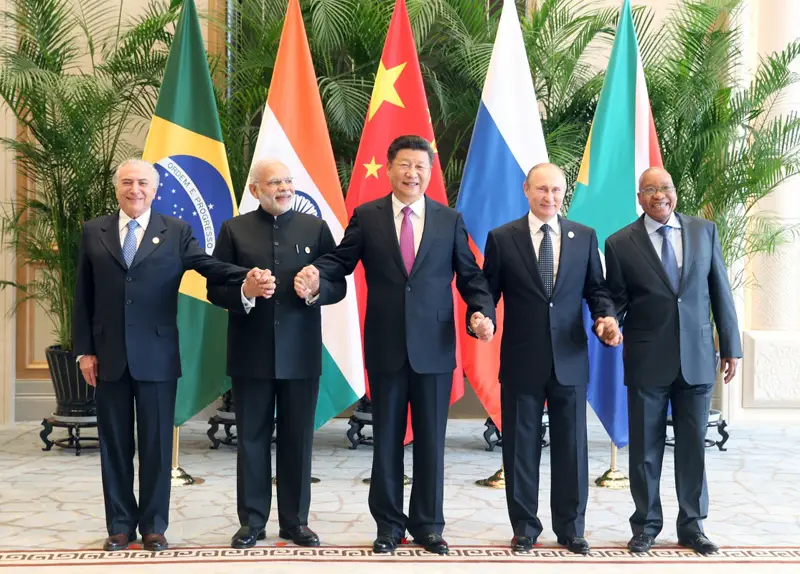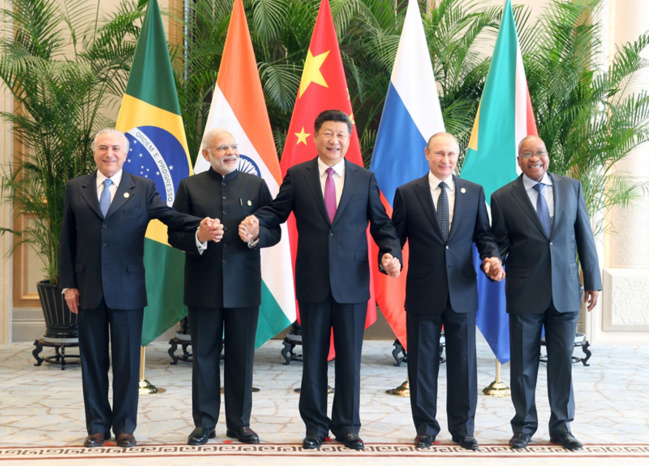By Yu Yang, Shi Pengfei, Hu Zexi, Huang Fahong from the People’s Daily
China’s "Belt and Road" initiative has become a major buzzword at the G20 Hangzhou Summit. Experts have stated that as a proposal aimed at boosting economic development, the initiative and the G20, as a mechanism specializing in economic governance, should be able to complement each other given their broad coverage.
In a speech delivered at the B20 summit that opened Saturday, Chinese President Xi Jinping pledged to the world that “China's development has benefited from the international community, and we are ready to provide more public goods to the international community.”
He further elaborated that “I have proposed the initiative of building the Silk Road Economic Belt and the 21st Century Maritime Silk Road to share China’s development opportunities with countries along the Belt and Road and achieve common prosperity.”
Hangzhou, the host city of this year’s G20 summit, is located at the intersection of the Silk Road Economic Belt and the 21st Century Maritime Silk Road. In ancient times, it was thanks to these two routes’ counterparts that the city stayed connected to the outside world.
Marco Polo, the well-known Italian merchant traveler, hailed the city as the “finest and most splendid city” in the world when he visited Hangzhou over 700 years ago. Via these routes, silk was exported worldwide as early as the Song Dynasty about 1,000 years ago, bringing fame to the picturesque city.
Currently, the booming silk industry along the modern routes is still making great contributions to regional development. Data shows that Zhejiang Province's export value of textile machines in the first seven months of this year reached 2.84 billion yuan ($425 million), of which 2.42 billion yuan was contributed by countries along the “Belt and Road.”
Given their broad coverage, the “Belt and Road” Initiative and the G20, with both their common ground and different emphases, are now carrying more weight in the global economy.
The “Belt and Road” Initiative reaches out to more than 60 countries and regions whose total population reaches 4.4 billion and an economic aggregate of $21 trillion.
The “Belt and Road” initiative focuses on the structural reform of the world economy, said Wan Zhe, a chief economist with the International Cooperation Center (ICC) of the National Development and Reform Commission (NDRC), adding that instead of self-isolation, the initiative seeks to take advantage of countries’ ability to complement each other and work toward common development.
While economic crisis often leads to seclusion, the proposal made by China is a signal to the world that a community of shared destinies in Eurasia and even the world can be established through deeper collaboration, she further pointed out.
The global media is also paying close attention to the initiative. According to Deputy Editor-in-Chief Saad F. Al-Ejaiban of the Saudi Arabian newspaper Al Jazirah, locals are still discussing Xi’s January Saudi visit. Many are also saying that the initiative will able to tighten bilateral ties and promote the economic transformation of both countries.
As of July, China had invested a total of $51.1 billion to countries along the “Belt and Road.” In 2015, the bilateral trade volume between China and these countries exceeded $1 trillion. In addition, the Asian Infrastructure Investment Bank (AIIB) and the Silk Road Fund are sure to substantially accelerate global infrastructure construction.
As infrastructure construction usually requires a large amount of capital, the “Belt and Road” Initiative, AIIB and other China-led programs will be able to facilitate the implementation of decisions reached at the G20 Summit by boosting the infrastructure construction of “Belt and Road” en-route countries,” said Astrid Skala-Kuhmann, director of the Department of Emerging Economies-Global Partnerships under the German Corporation for International Cooperation.
After the cooperation proposal was launched by China three years ago, over 100 countries and international organizations have joined the initiative, over 30 en-route nations have inked cooperation agreements with China and more than 20 states have launched international cooperation projects with China. With AIIB and the Silk Road Fund as examples, a series of representative projects have been launched.
“By pushing forward the ‘Belt and Road’ initiative, establishing the AIIB and hosting the G20 Hangzhou Summit, China has provided a lot to the international community and contributed more to reform of global economic governance,” Jonny Erling, reporter of Germany-based Die Welt commented.
In a speech delivered at the B20 summit that opened Saturday, Chinese President Xi Jinping pledged to the world that “China's development has benefited from the international community, and we are ready to provide more public goods to the international community.”
He further elaborated that “I have proposed the initiative of building the Silk Road Economic Belt and the 21st Century Maritime Silk Road to share China’s development opportunities with countries along the Belt and Road and achieve common prosperity.”
Hangzhou, the host city of this year’s G20 summit, is located at the intersection of the Silk Road Economic Belt and the 21st Century Maritime Silk Road. In ancient times, it was thanks to these two routes’ counterparts that the city stayed connected to the outside world.
Marco Polo, the well-known Italian merchant traveler, hailed the city as the “finest and most splendid city” in the world when he visited Hangzhou over 700 years ago. Via these routes, silk was exported worldwide as early as the Song Dynasty about 1,000 years ago, bringing fame to the picturesque city.
Currently, the booming silk industry along the modern routes is still making great contributions to regional development. Data shows that Zhejiang Province's export value of textile machines in the first seven months of this year reached 2.84 billion yuan ($425 million), of which 2.42 billion yuan was contributed by countries along the “Belt and Road.”
Given their broad coverage, the “Belt and Road” Initiative and the G20, with both their common ground and different emphases, are now carrying more weight in the global economy.
The “Belt and Road” Initiative reaches out to more than 60 countries and regions whose total population reaches 4.4 billion and an economic aggregate of $21 trillion.
The “Belt and Road” initiative focuses on the structural reform of the world economy, said Wan Zhe, a chief economist with the International Cooperation Center (ICC) of the National Development and Reform Commission (NDRC), adding that instead of self-isolation, the initiative seeks to take advantage of countries’ ability to complement each other and work toward common development.
While economic crisis often leads to seclusion, the proposal made by China is a signal to the world that a community of shared destinies in Eurasia and even the world can be established through deeper collaboration, she further pointed out.
The global media is also paying close attention to the initiative. According to Deputy Editor-in-Chief Saad F. Al-Ejaiban of the Saudi Arabian newspaper Al Jazirah, locals are still discussing Xi’s January Saudi visit. Many are also saying that the initiative will able to tighten bilateral ties and promote the economic transformation of both countries.
As of July, China had invested a total of $51.1 billion to countries along the “Belt and Road.” In 2015, the bilateral trade volume between China and these countries exceeded $1 trillion. In addition, the Asian Infrastructure Investment Bank (AIIB) and the Silk Road Fund are sure to substantially accelerate global infrastructure construction.
As infrastructure construction usually requires a large amount of capital, the “Belt and Road” Initiative, AIIB and other China-led programs will be able to facilitate the implementation of decisions reached at the G20 Summit by boosting the infrastructure construction of “Belt and Road” en-route countries,” said Astrid Skala-Kuhmann, director of the Department of Emerging Economies-Global Partnerships under the German Corporation for International Cooperation.
After the cooperation proposal was launched by China three years ago, over 100 countries and international organizations have joined the initiative, over 30 en-route nations have inked cooperation agreements with China and more than 20 states have launched international cooperation projects with China. With AIIB and the Silk Road Fund as examples, a series of representative projects have been launched.
“By pushing forward the ‘Belt and Road’ initiative, establishing the AIIB and hosting the G20 Hangzhou Summit, China has provided a lot to the international community and contributed more to reform of global economic governance,” Jonny Erling, reporter of Germany-based Die Welt commented.
 Menu
Menu
 “Belt and Road” initiative highlighted at G20 Summit
“Belt and Road” initiative highlighted at G20 Summit

















